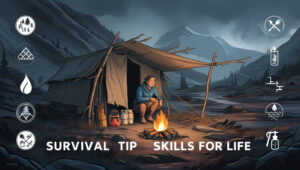Survival Tips for Life
Being able to adapt and survive is crucial in a world full of uncertainties. Having a solid foundation and survival skills in life are essential for traversing through natural disasters, handling unforeseen situations, and overcoming obstacles in daily life. This guide offers priceless survival tips for life to make sure you’re ready for anything.
TABLE OF CONTENTS
I. Starting Point
A. Importance of Being Prepared for Emergencies
Being prepared for emergencies at any time can make the difference between chaos and peace. To protect yourself and your loved ones, you must first value preparation. Being unprepared can have dire consequences, including panic attacks, physical harm, and more. Therefore, adopting a survival attitude is essential to prospering in both unusual and everyday situations.
B. Initial Thoughts on the Survival Tips for Life Covered in the Post
This guide will cover essential survival skills in life, emphasizing various areas such as having access to food and water, shelter, warmth, first aid, communication, security, and psychological readiness. You will have a thorough understanding of different survival tips for everyday life that can enhance your ability to manage life’s challenges by the time you finish reading this post.
II. Water and Food Supply
A. Securing a Reliable Source of Clean Drinking Water
Water is essential to life, so having access to safe drinking water is necessary to survive. Here are a few crucial tips for survival:
1. Storing Water in Containers
- Choose the Right Containers: For water storage, use glass or plastic containers approved for food use. Ensure their sanitization and secure sealing to prevent infection.
- Storage Locations: To prevent deterioration, store water containers in a dark, cold environment.
This is practical advice, but are they not life-and-death tips for survival?
2. Techniques for Purifying Water
Take into account these tips for survival to make sure the water you drink is safe:
- a. Boiling Water: Boiling is one of the easiest and most efficient ways to purify water. To eradicate pathogens, boil water for a minimum of one minute.
- b. Using Tablets for Water Purification: In an emergency, these work well. For optimal use, adhere to the directions on the packaging.
- c. Building a Temporary Water Filter Out of Natural Materials: To make a filter, combine charcoal, sand, and gravel. To get rid of contaminants, pour water through the layers of these materials.
3. Creating a Basic Drinking Vessel using Organic Materials
You may have to improvise in survival scenarios. Here are some suggestions and remember to make them a part of your survival skills in life:
- Hollowed-Out Rocks: Carefully hollow out a rock that has the capacity to hold water.
- Leaves: Some huge leaves have the ability to form cups.
- Bamboo: To make a natural drinking vessel, cut a stem of bamboo.
B. Keeping Non-Perishable Food Supplies in Stock

1. Dried foods, canned goods, and other options that keep for a long time
- Canned Goods: Keep a wide range of fruits, vegetables, meats, and legumes on hand. When preserved correctly, they last for many years.
- Dried Foods: Nutrient-dense foods that are long-lasting include rice, pasta, and lentils.
2. Calorie and Nutrient Requirements
Understanding your calorie needs is vital for planning your food supply. Aim for a balanced diet that includes:
- Carbohydrates
- Proteins
- Fats
- Vitamins and minerals
3. Foraging for Edible Plants and Fungi in the Wild
Finding out how to forage can save your life in a survival emergency. Here are some pointers you can enhance your survival tips for life:
-
Recognize Edible Plants:
Examine the local flora to identify species that are safe to consume. Field guides and other resources can be useful. -
Avoid Toxic Plants:
Learn about harmful plants so that you don’t accidentally consume them.
III. Shelter and Warmth
A. Establishing a Safe and Secure Shelter
A shelter protects you from the elements and provides security.
1. Improvising Shelter Out of What’s Available
- Branches and Leaves: Build a framework out of branches, then cover it with leaves to provide insulation.
- Animal Hides: If they’re available, animal hides make excellent winter insulation.
2. Provide Protection and Insulation from the Elements
- Location: Choose a location that offers protection from wind and rain. Seek out obstacles found in nature, such as trees or rocks.
- Insulation: To stay warm, wrap yourself with pine needles, grass, or leaves.
B. Maintaining Body Temperature
If you ask what are some survival tips we always remember, well, keeping warm is crucial for survival.
1. Layering Clothing
- Wear Multiple Layers: To maintain body heat, utilize insulating layers, a waterproof outer layer, and thermal undergarments.
- Avoid cotton: It absorbs moisture, which increases the risk of hypothermia. Choose materials made of wool or synthetics.
2. Fire-Starting Techniques
Fire provides light, warmth, and a way to cook food.
- a. Using Flint and Steel: This age-old technique is successful, but it requires expertise.
- b. Rubbing two sticks together: This age-old method calls for patience and repetition.
- c. Focusing Sunlight Through a Clear Container or Magnifying Glass: This technique can burn tinder quickly on sunny days.
IV. First Aid and Medical Supplies
A. Putting Together a Complete First Aid Kit

1. Necessary medical supplies
- Bandages and Gauze: They are used to treat wounds.
- Antiseptic Wipes: For wound cleaning and infection control.
- Pain Relievers: Over-the-counter medications like ibuprofen or acetaminophen.
2. Medications and Personal Hygiene Products
Add any prescription drugs you might require, as well as supplies for personal hygiene like hand sanitizer.
B. Basic Medical Knowledge and Skills
Basic medical knowledge can save lives. A little knowledge on medical and herbal remedies, for example, is one of the survival tips for everyday life that most people overlook.
1. Wound Care and Prevention of Infections
- Clean the wound: To treat and rinse wounds, use clean water and an antiseptic.
- Put on a bandage: Cover the wound to keep germs and dirt out.
2. Treating Common Illnesses and Injuries
Learn how to treat:
- Sprains and Strains: Use R.I.C.E. (rest, ice, compression, elevation) as their treatment.
- Burns: After cooling the area under running water, apply a sterile dressing.
3. Improvising Medical Supplies from Natural Materials
You may need to take advantage of what’s available in an emergency:
- Plantain Leaves: They can be applied to insect bites to relieve pain.
- Honey: Its inherent antimicrobial qualities allow for its application to wounds.
V. Communication, Interaction, and Direction
A. Keeping in Touch with Your Loved Ones

1. Devices for Emergency Communication
Think about purchasing gadgets such as:
- Hand-Cranked Radios: Hand-cranked radios are used for news and meteorological updates.
- Satellite Phones: Helpful in isolated locations without mobile connectivity.
2. Establishing a Family Meeting Point
Choose a Safe Location: Decide on a place to meet in the event that an emergency separates you.
B. Getting By Without Modern Technology
It’s important to know how to navigate, especially in new places.
1. Reading Compass and Map Skills
Learn the fundamentals of navigation by becoming proficient with a compass and map reading.
2. Methods of Celestial Navigation
Discover how to navigate by utilizing the sun, moon, and stars. For example, the North Star can help you locate true north at night.
VI. Security and Self-Defense
A. Protecting Your Family and Yourself
When it comes to survival, safety comes first. This is why we stress the importance of developing a regular habit of preparedness, thereby incorporating your survival tips into your daily routine.
1. Protecting Your Home and Assets
- Strengthen Entrances: To prevent trespassing, install deadbolts and secure windows.
- Establish a Safe Room: Set aside a room in your house for protection in case of need.
2. Basic Self-Defense Techniques
Knowing how to defend yourself can give you power.
- Striking: Develop your striking technique without endangering your safety.
- Grappling: How to break free from restraints and subdue an aggressor.
- Evasion: Learn how to steer clear of any dangers.
B. Handling violent or civil unrest
It’s imperative to understand civic disturbance in order to survive.
1. Avoid Confrontation.
- Stay informed: Monitor social media and news sources to avoid potential problems.
- Keep calm: Remaining calm will help you avoid rising tensions.
2. Seeking Safe Refuge
Determine Safe Places: Be aware of the locations to go in case you need to flee.
Make a plan for your escape. Learn the various paths leading to safety.
VII. Spiritual and Psychological Readiness
A. Preserving Emotional and Mental Health

1. Techniques for Stress Management
- Meditation and Mindfulness: Reduce anxiety and maintain attention using mindfulness and meditation.
- Journaling: Writing down ideas on paper helps to ease tension and aid in emotional processing.
2. Promoting an Optimistic Outlook
- Remain Positive: Having an optimistic outlook will help you overcome obstacles.
- Establish sensible objectives: Divide work into doable chunks to keep yourself motivated.
B. Taking Care of Spiritual Needs
Taking care of your spiritual well-being might help you feel better when things are hard.
1. Bringing along a Bible or other spiritual or religious texts
Keep spiritual texts with you; they can offer consolation and direction during trying times.
2. Praying or Partaking in Other Spiritual Activities
Pray Often: To build mental toughness, make time each day for prayer or other spiritual activities.
VIII. Final thoughts
A. Summary of Essential Life Survival Advice

B. Motivation to Put These Skills Into Practice
Don’t put off learning until an emergency occurs. To make your life survival skills instinctive, practice them often.
C. Request for Action
Please feel free to share your personal survival stories and advice in the comments section below. Together, let’s build a community of capable people who are equipped to handle whatever challenges life presents.

In conclusion, with the right information and preparedness, you can learn how to thrive in any circumstance and endure life’s challenges. These survival tips for life are just the beginning of your journey; continue to learn and remain vigilant. It’s essential to your survival!




 Welcome to GainPioneers Team, your trusted resource for discovering the latest and most innovative digital tools and technologies. Our website is dedicated to exploring the intersection of Education and Learning, with a particular focus on Educational Technology and AI-Powered Educational Tools. Whether you're an educator, student, or lifelong learner, we provide curated recommendations and links to cutting-edge software, including ebook creators and more, to enhance your learning experience. Join us as we navigate the future of education and unlock new possibilities in digital learning.
Welcome to GainPioneers Team, your trusted resource for discovering the latest and most innovative digital tools and technologies. Our website is dedicated to exploring the intersection of Education and Learning, with a particular focus on Educational Technology and AI-Powered Educational Tools. Whether you're an educator, student, or lifelong learner, we provide curated recommendations and links to cutting-edge software, including ebook creators and more, to enhance your learning experience. Join us as we navigate the future of education and unlock new possibilities in digital learning.